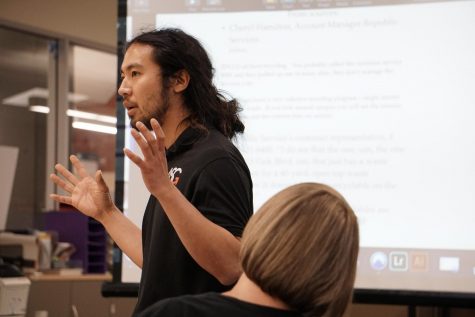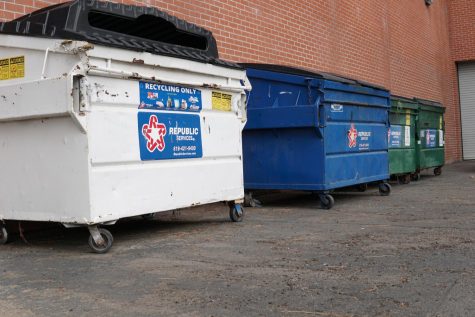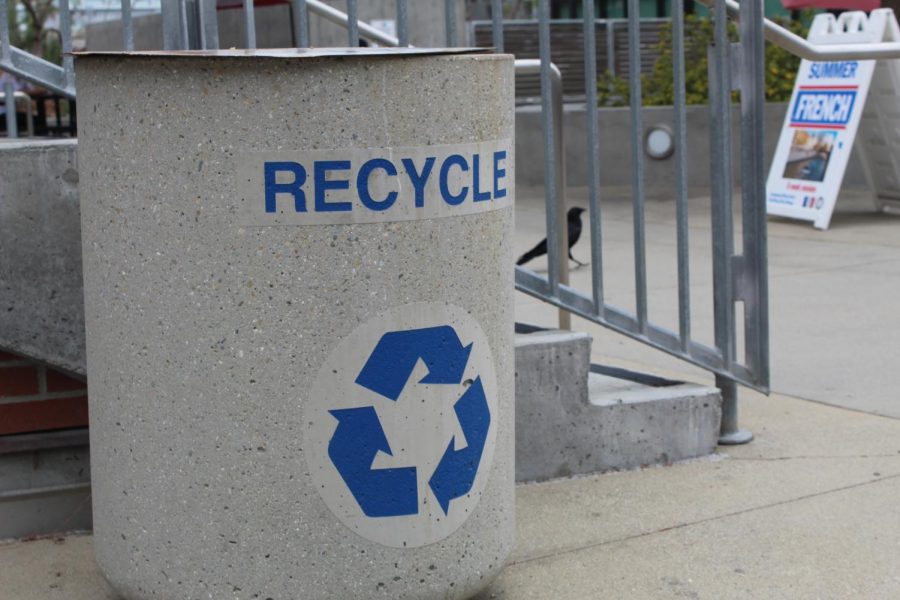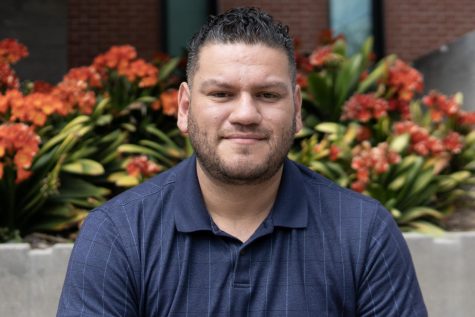City College ASG recycling proposal gets canned
District contract with waste removal company prevents ASG recycling idea from moving forward.
An ASG plan to recycle the contents of receptacles like this one on the AH/BT quad has met resistance. Photo by Jonny Rico/City Times
May 8, 2019
Josh Tanida walks through the campus, looking inside trash cans and recycling bins. But he can’t really tell the difference between them based on the contents inside.
Tanida, a San Diego City College student and Health, Safety and Environmental Officer of the Associated Student Government, picks out recyclable items like soda cans and bottles and brings them back to the ASG office in the M-building.
He’s hoping to get others involved in recycling by implementing a formal program on campus, but he has run into resistance from the San Diego Community College District.
“All the blue trash cans out there are full with mixed garbage,” Tanida said. “We want to implement a segregated recycling system. You just can’t put all recycling in one bin.
“We want to educate people on what recycling is and how to do it properly.”

Josh Tanida presented his proposed recycling program to the ASG. By David Ahumada/City Times
The fact that there is no clear distinction between garbage and recycling through the bins’ contents led Tanida to believe there wasn’t a recycling program at all. That led him to plan out a program of his own.
The biggest problem with Tanida’s recycling program idea is the standing contract that SDCCD has with waste management company Republic Services.
A copy of the contract was obtained by the City Times through the California Public Records Act.
According to the contract, Republic Services offers the district waste removal services, which include the free removal of recyclables.
“The contractor is counting on those recyclables,” said Chris Manis, vice chancellor of facilities management for SDCCD, at a May 3 ASG meeting. “There is no way I can legally say you can implement a recycling program without being liable to a lawsuit.”
The contract does have a clause that opens the opportunity for Tanida and the ASG to propose a new recycling idea to the district and Republic Service.
“If a detailed recycling plan or information to the betterment of recycling within the District and our environment is available, please submit this information with the bid,” reads the contract.
But going this route would not be a fruitful option, according to Manis.
“They would just be dying on their swords,” said Manis.
Manis does not believe a student-run recycling program can be implemented because there is no way to guarantee results.
“Contractor shall provide year around rubbish/waste and recyclable material pick-ups as specified in Section III – Respondent’s Response Form, or on an as-needed basis,” reads the contract.

Republic Service provides City College with trash containers, recycling containers and green containers. By David Ahumada/City Times
Manis appreciated the passion that Tanida has for helping the environment, but wonders about the future.
“What will happen after (Tanida) is no longer here?,” Manis said. “Is there going to be another student as passionate as him?”
Another problem Manis has with student-run, and even campus-run projects, is that students and faculty are only around for 10 months out of the year. But the trash and recycling need to be picked up all year long.
The district would not only be legally liable for breaching its contract with Republic Service if it allowed Tanida’s recycling program to be implemented, but it could also face penalties and fines from government agencies if health codes and standards are not met by the consistent removal of trash and recycling.
Sonny Garibay contributed to this story.













josh • May 9, 2019 at 4:35 pm
its a fairly simple solution but what is done is far more complex, the way I understand it from talking to administration and republic is that all receptacles go to a general waste dumpster and then from there it can either go to a land fill or a MRF (materials recovery facility). from the report I saw about 1400 tonnes was diverted and 500 tonnes went straight to landfill. now these numbers are misleading in that diverted waste is not recycling, ideally the materials at the MRF would be recovered and recycled but that is never touched on and I have asked republic for actual recycling numbers and got a non answer. basically if it goes to a MRF they consider it recycled even though it may never reach a recycling plant. here’s a quick video of where I came up with my thesis, https://youtu.be/Z4v7jG1MvmM & https://youtu.be/R7N5a476DKQ City College has to have an astronomical contamination level since trash and recycling are collected together and who would buy trash? a new system needs to be put in place. why does a large corporation have such concerns with students collecting recycling? are we really cutting into there profits?
Debbie Helm • May 9, 2019 at 12:10 pm
The recycling company is only as good as the people that feed into it. In the over 20 years I have been on campus, I have personally witnessed in various settings, people throwing recyclables into waste containers, and waste and recycling containers being combined into one large waste receptacle…ie…recycling, if it is collected, is going straight into the larger waste bins and is not being recycled. There is a “myth” on campus that we don’t really recycle. Do we? How do we dispel this myth…or is it in fact the turth??
Carol Whaley • May 9, 2019 at 10:13 am
Does Republic Services separate recyclables from general trash and recycle them or does general trash go straight to the dump? City College needs better recycling receptacles that are more clearly marked with what should and shouldn’t be put in them and they need to be placed near regular trash cans so people can separate their trash from recyclables easily. The blue cans in classrooms and offices have become a joke because in the rooms in which I teach, they are usually the only can. I imagine custodians are emptying them into the regular trash because that’s what’s in them. I think ASG can take on a campaign to bring awareness and solutions to this issue without violating the contract with Republic Services and get more of the recyclables on their way to proper recycling and out of the landfill. Ultimately, it will be up to custodial services and campus management to maintain.